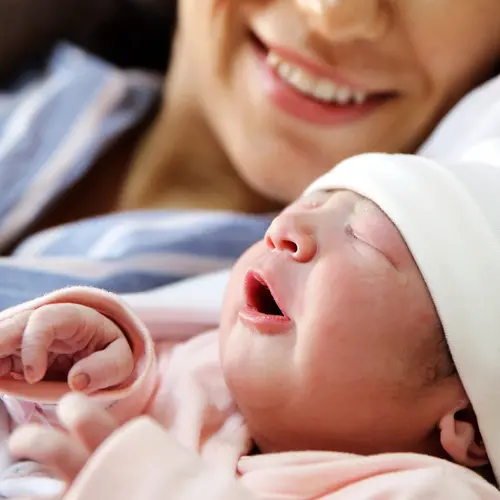What Are Skin Conditions During Pregnancy?
Along with the obvious changes that your body goes through during pregnancy, the surge in hormones also affects your skin. Most of the skin conditions seen in pregnancy will disappear after you have your baby. There are three categories of skin conditions during pregnancy:
- Hormone-related
- Preexisting
- Pregnancy-specific
Common Skin Conditions During Pregnancy
- Hyperpigmentation. This condition is a darkening of the skin and is caused by an increase in melanin, the substance in the body that is responsible for color (pigment). Pregnancy causes more melanin in your body.
- Melasma (also known as chloasma). Melasma is a form of hyperpigmentation. It causes tan or brown patches, usually on the face. This condition is so common among pregnant people that it's called "the mask of pregnancy."
- Pruritic urticarial papules and plaques of pregnancy (PUPPP). This is an outbreak of pale red bumps on the skin. These lesions can cause itching or may burn or sting. They can range in size from a pencil eraser to a dinner plate. When they form together in a large area, they are called plaques. In pregnancy, these lesions can appear on the abdomen, legs, arms, and buttocks.
- Stretch marks. Skin that’s been stretched by pregnancy or weight gain, or shrunk by extreme weight loss, bears a type of scarring called stretch marks, or striae. Stretch marks usually start off reddish or purplish in color, then turn glossy and streaked in silver or white.
- Skin tags. A skin tag is a small flap of tissue that hangs off your skin by a connecting stalk. Skin tags are benign, meaning they are not cancer. You’ll usually find them on your neck, chest, back, under your breasts, and in your groin. They’re common in pregnant people and usually painless unless something rubs against them.
- Acne, psoriasis, atopic dermatitis. All of these conditions can worsen with pregnancy. They should improve after the birth of the baby.
- Varicose veins. Hormone changes during pregnancy can cause these twisted, enlarged veins mainly found in your legs.
- Prurigo of pregnancy. These are scattered itchy bumps that can happen at any stage of pregnancy.
- Pemphigoid gestationis.Blisters appear on your belly and could spread to other areas. This condition may boost your odds of complications, including preterm birth.
- Intrahepatic cholestasis. This liver condition causes itching, but no rash, on the palms of your hands and soles of your feet. It can lead to preterm birth. If you have it, contact your doctor.
Treatment of Skin Conditions During Pregnancy
As noted, most of these skin conditions will clear up on their own after the baby is born. If they don’t go away, or if you want to do something about them during pregnancy, there are treatments available. Don't use any medication or treatment while you are pregnant without talking to your doctor.
- Melasma. You can use certain prescription creams (such as hydroquinone) and some over-the-counter skin care products to treat melasma. But talk to a dermatologist for a proper diagnosis before you choose to treat it yourself. If you have melasma, try to limit your time in sunlight, especially between the hours of 10 a.m. and 2 p.m. Use a sunscreen with an SPF of at least 30 when outside.
- PUPPP. Your doctor may prescribe an antihistamine or topical corticosteroids. For relief, you should wash with lukewarm (not hot) water, apply cool compresses or wet cloths to the affected areas, and wear loose, lightweight clothing. Don’t use soap on involved skin, since it will cause more dryness and itching.
- Stretch marks. Wait until after your baby is born before seeking treatment for stretch marks. There isn’t a proven treatment, but sometimes laser or prescription creams can help.
- Skin tags. Your doctor can remove skin tags by cutting them off with a scalpel or scissors, or with electrosurgery (burning them with an electric current).
- Prurigo of pregnancy. You can manage this condition with moisturizers and topical steroids.
- Intrahepatic cholestasis. Some treatment options include medications to stop your itch and reduce bile. Cold baths and ice water can also help.
- Pemphigoid gestationis. Your doctor will prescribe topical or oral corticosteroids for this condition.
- Pruritic folliculitis. You can relieve your symptoms with benzoyl peroxide, moisturizer with menthol, steroid cream or ointment that you apply to your skin, and oral antihistamines.
- Pustular psoriasis of pregnancy (PPP). This life-threatening condition is hard to treat. In mild cases, doctors use a low dose of corticosteroids. Serious cases will need a higher dose, which can harm your baby.
Skin Conditions During Pregnancy Home Remedies
There are a few natural ways to relieve itchy skin when you’re pregnant:
- Apply a scent-free lotion or moisturizer.
- Wear loose clothing that’s less likely to irritate your skin.
- Wear clothes made of natural fibers like cotton.
- Take a cool bath.
- Put ice on your skin.
- Take an oatmeal bath once or twice a week.
- Avoid hot baths or showers, which can dry your skin out.
- Try not to go out in the heat of the day.

